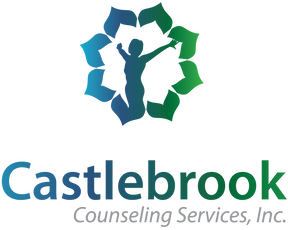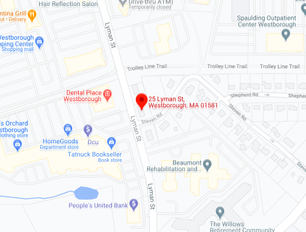Clinician Spotlight: An Interview with Cynthia Williams, LMHCBy Lauren Chapin, LICSW Welcome to Castlebrook’s newest blog series, Clinician Spotlight! In this series, I will be sitting down with some of our wonderful therapists for a cozy conversation about work, mental health, and many life tidbits in between. This month, I was honored to chat with Cynthia Williams, LMHC who has been a therapist at Castlebrook since 2019. Cynthia and I shared some early morning laughs through Zoom as she detailed her path to becoming a therapist, her unique style, as well as what book she is currently reading (and thinks you should too!). ******** Lauren: What made you want to become a therapist? Cynthia: That’s a really great question. Actually, I wanted to be a teacher from the very first memory I have. I was even pretending to teach my dolls! Then, in 9th grade, I took an early college class in psychology and I was like, “now THIS is for me.” I loved learning about Pavlov, conditioning, Sigmund Freud, and I already loved helping people…after that, I never waivered. It just fits so well. I think I even still have my old notebook where I drew diagrams of different sleep patterns. It made so much sense to me and because I never really fit in with my family, it was comforting to learn about human nature and what makes people tick in relationships. I was like, “oh, now THIS is going to explain everything” and it did. I loved learning about psychology because if I didn’t know it, then I couldn't address it. Lauren: How would you describe your therapeutic style? Cynthia: It depends! During intake, my spiel includes the fact that I’m really skills-based. My job is to work myself out of a job. If you want to see me for 15 years, go for it! I don’t know why you would want to [laughs], I’m a strong cup of tea, but my job is to make it so you can go back to your life at any point in time and not have to ask what my advice would be. I would say that I’m definitely a cheerleader for progress and my job is to support people into not only being the person they want to be, but to experience a life they want to experience regardless of the parts they can’t control. I also tell my clients that I would never ask them to do something that I haven’t already tried or that I’m not willing to try. I lead a lot like a role model, and I will say, “this is what works for me.” In a recent session, we focused on self-care and I said over and over that I have rules I live by as an “ADHD’er” and those rules work for me, it’s about finding what works for you. Conventional, unconventional, it doesn’t matter–what matters is that it works and that it’s healthy. Lauren: What is one of your rules as an “ADHD’er”? Cynthia: Whenever I leave a room, I have to take something out of that room that belongs to the room I’m going to. I’m a cup collector [laughs] and that’s how I clean. Lauren: What would you say to a person who is thinking about starting therapy but isn’t sure about taking the plunge? Cynthia: I would definitely say that there’s no reason to not invest in yourself, to not get help on the journey of being the person that you want to be. No one has to go on this journey alone. Even if you just show up once and never see me again, that’s okay. You showed up, you’re putting in effort, and you’re answering all of these tough questions. You’re trying. You’re putting the feelers out there even if it’s not for you and I’m proud of you for even considering doing that. I do like to say, “what’s the worst thing that could happen? You have a few sessions and you realize that you’re really well adjusted and you don’t need it? Great!” [laughs]. I’m only here as long as you want me to be here. We can build slowly or hit the ground running. I’m also very validation based. If you’re putting this much effort into changing your day to day life and you’ve improved your experience this much, it's not because of anything I did, it’s because of you. Lauren: What kind of clients do you work with? Cynthia: I work with everybody! There are some conditions that I have less comfortability with, but kids, teens, adults…teens love me! It’s because I curse in session [laughs]. I always say in intake that this is not going to be stiff. Who you are going to run into in Target with their bestie is who you are going to get in session. There is no reason for you to feel like I have all of the answers. I tell all of my clients that they’re the expert in the room. At the end of the 45 minutes, I get to walk away and mind my own business and they don’t. It has to be for them, it has to work for them. Lauren: What book are you reading right now? Cynthia: Ooooo I just finished my first reread of Discovery of Witches by Deborah Harkness. I also finished the Hobbit and I'm moving onto the Lord of the Rings Trilogy. I have a rule. Anything that’s 200 pages or less I’ll read on my Kindle, anything more than that I listen through audiobooks. I also like reading spooky mysteries. I read everything. Lauren: If you could only recommend one or two mental health books, what would they be? Cynthia: The one that comes to mind is called Big Friendship by Aminatau Sow and Ann Friedman. It’s about two adult women who talk about the growth that long distance friendships and adult friendships require. I have read that book probably like four times. It talks about conflict resolution and how big emotions fit into complicated relationships. I remember reading it and going, “well this explains a lot!” Another book that I’m a massive fan of is The Explosive Child by Ross Greene. It’s about how the capabilities of kids do not always accurately reflect our expectations of them and how this can affect them. For example, telling a child that they can control their feelings when they absolutely cannot. It’s like we’re asking a fish to climb a tree. Kids do not have the same capacity as adults do. I’ve had kids tell me that they’re trying but that it’s not enough and I ask them, “did you try your best?” You’re never going to be good enough for anybody else until you’re good enough for yourself first. Lauren: That’s a great phrase! What are some other phrases or metaphors that you like to use in session? Cynthia: One thing I like to say is “how can we make things 1% better?” One percent is all I ever ask for. A lot of people say, “that’s not going to solve the problem.” And no, it’s not going to. But if it’s going to make it one percent better, is it worth the effort to get there? I’m very solution focused. I think that kind of fits with the whole, “it’s not my job to make you dependent on me.” I also always ask clients what they learned from today’s session. Clients always end up pointing out things about the session that I didn’t even notice. I’m all about the feedback, especially when it comes to mistakes. What feedback can you give yourself, what can you learn from this situation? Mistakes are for learning. Lauren: I appreciate you carving out time in your schedule to chat! What makes this important to you? Cynthia: I love stuff like this. I love humanizing healthcare providers. Sitting there and nodding [as a therapist] is for the birds. ****** At the time of this blog post, Cynthia is accepting new clients. Please fill out the intake form on our website or call our intake clinician at 508-475-9110 to inquire.
0 Comments
|
Archives
May 2025
Categories |
Mission Statement
Castlebrook Counseling Services, Inc. is a group of private practice clinicians with a shared goal of strengthening our community by providing therapy and clinical support designed for children, adults, and families to successfully meet life’s challenges.
 RSS Feed
RSS Feed

